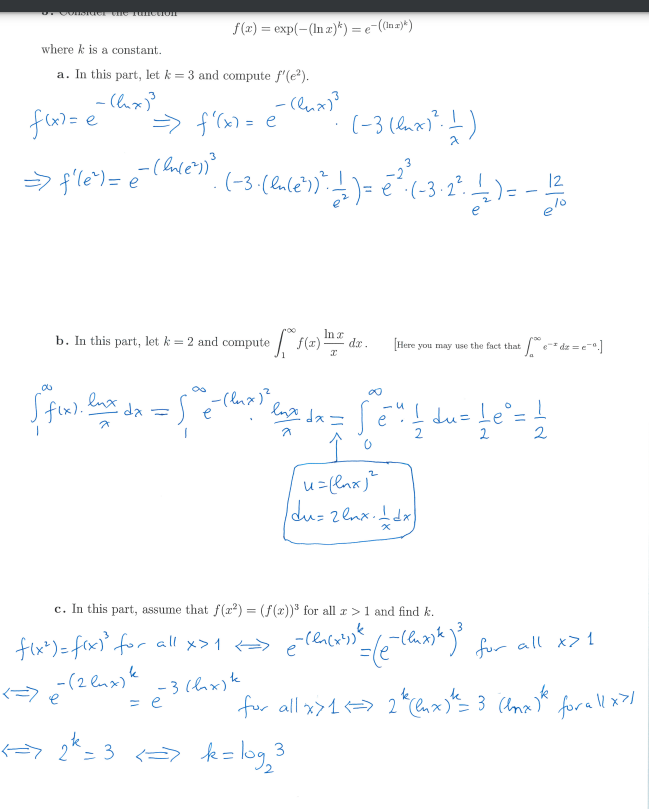Home /
Expert Answers /
Calculus /
f-x-exp-lnx-k-e-lnx-k-where-k-is-a-constant-a-in-this-part-let-k-3-and-compute-f-pa820
(Solved): f(x)=exp(-(lnx)^(k))=e^({:-(lnx)^(k))) where k is a constant. a. In this part, let k=3 and compute f ...
f(x)=exp(-(lnx)^(k))=e^({:-(lnx)^(k)))
where k is a constant.
a. In this part, let k=3 and compute f^(')(e^(2)).
f(x)=e^(-(lnx)^(3))=>f^(')(x)=e^(-(lnx)^(3))*(-3(lnx)^(2)*(1)/(x))
=>f^(')(e^(2))=e^(-(ln(e^(2)))^(3))*(-3*(ln(e^(2)))^(2)*(1)/(e^(2)))=e^(-2^(3))*(-3*2^(2)*(1)/(e^(2)))=-(12)/(e^(10))
b. In this part, let k=2 and compute \int_1^(\infty ) f(x)(lnx)/(x)dx.,\int_a^(\infty ) e^(-x)dx=e^(-0).\int_1^(\infty ) f(x)*(lnx)/(x)dx=\int_1^(\infty ) e^(-(lnx)^(2))*(lnx)/(x)dx=\int_0^(\infty ) e^(-u)*(1)/(2)du=(1)/(2)e^(0)=(1)/(2)
u=(lnx)^(2)
du=2lnx*(1)/(x)dx
c. In this part, assume that f(x^(2))=(f(x))^(3) for all x>1 and find k.
f(x^(2))=f(x)^(3) for all x>1<=>e^(-(ln(x^(2)))^(k))=(e^(-(lnx)^(k)))^(3) for all x>1
<=>e^(-(2lnx)^(k))=e^(-3(lnx)^(k)) for all x>1<=>2^(k)(lnx)^(k)=3(lnx)^(k) for all x>1
<=>2^(k)=3<=>k=log_(2)3
why can't we write for part b (lnx)^(2)=2lnx but we can write( (lnx)^(k))^(3)=3(lnx)^(k) ı dont understand this part